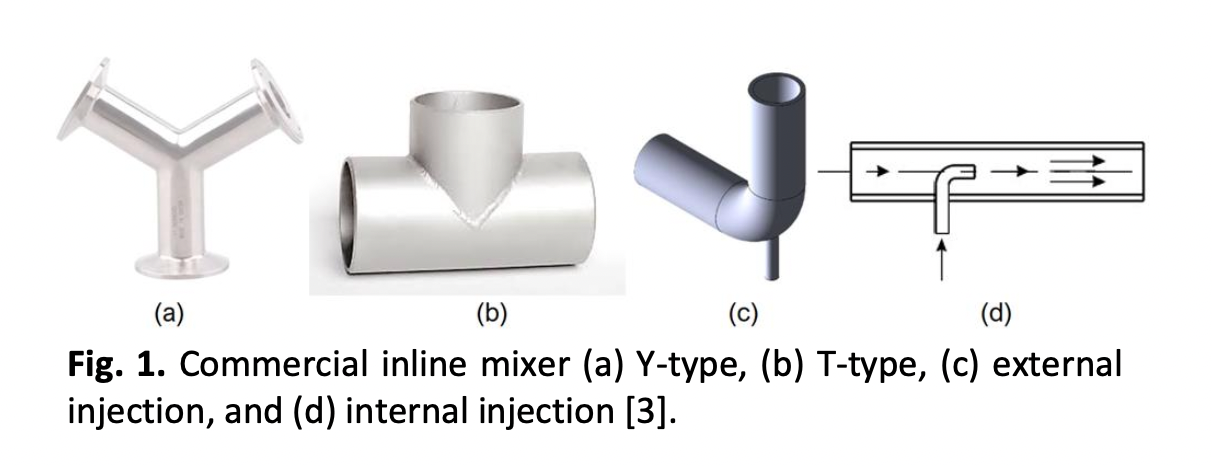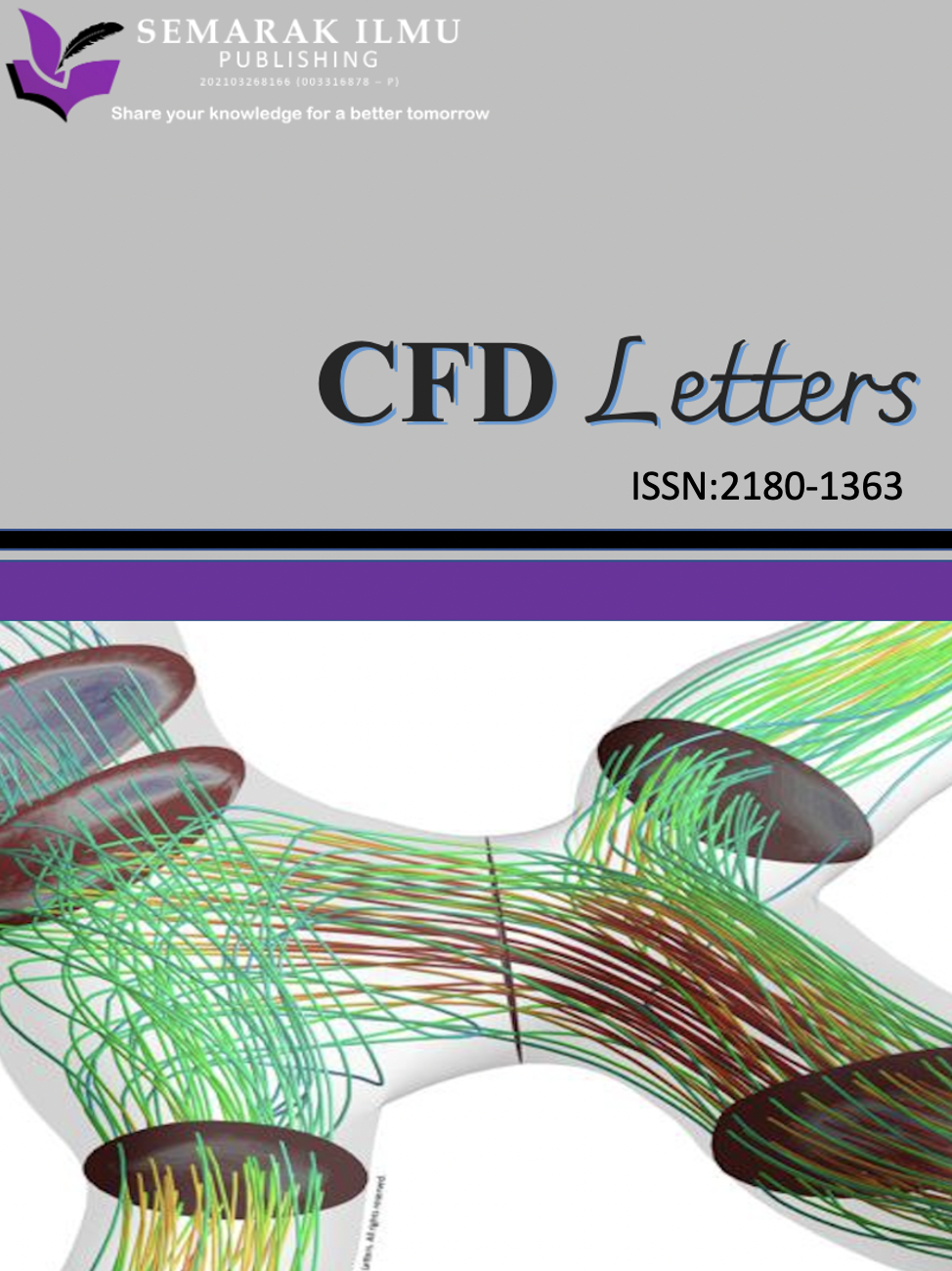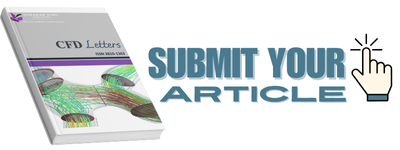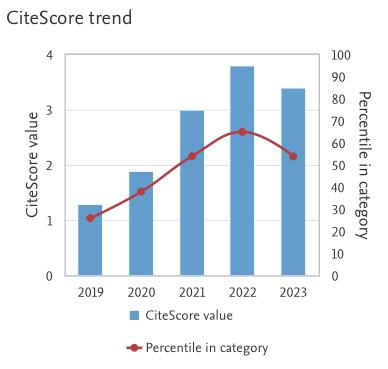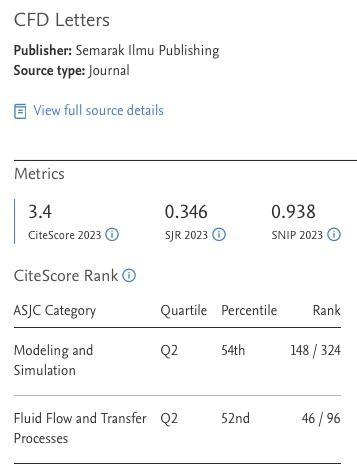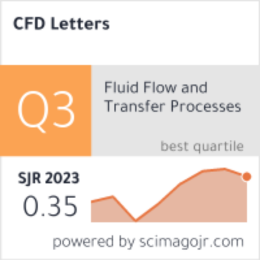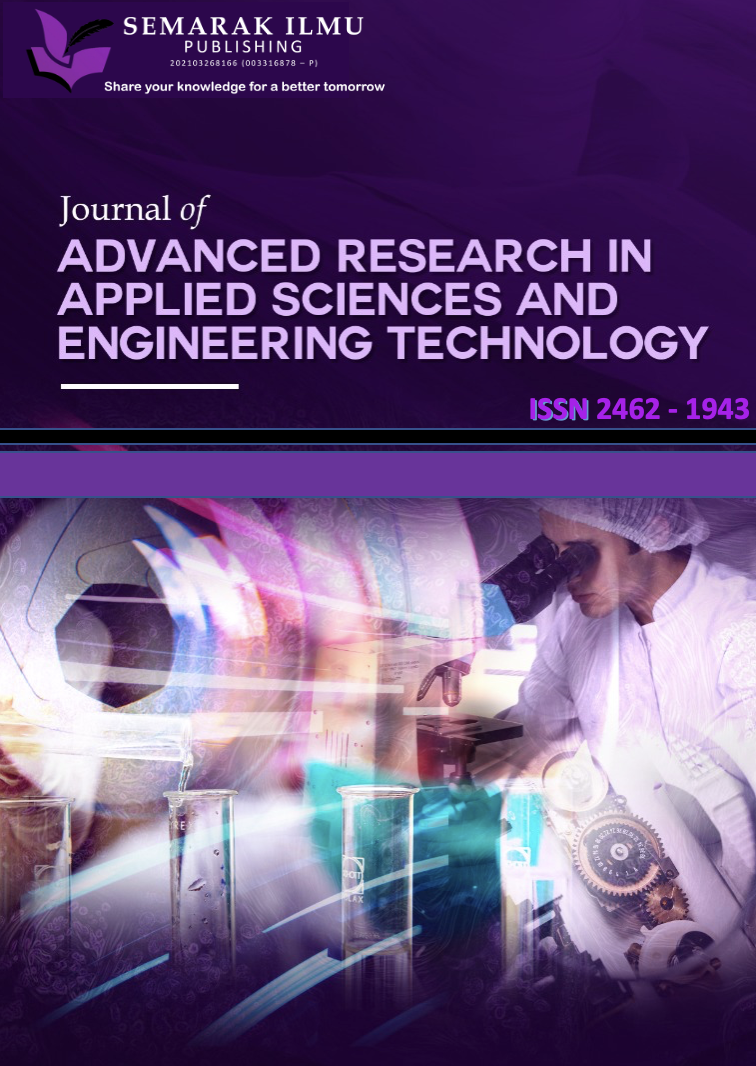Numerical Investigation of Hydrodynamics in Inline Mixers
DOI:
https://doi.org/10.37934/cfdl.15.8.135147Keywords:
hydrodynamics, inline mixer, T-mixer, Y-mixer, elbow mixer, internal injection, wall shear stress, CFDAbstract
The utilization of inline mixers for continuous fluid mixing is a common practice in chemical industries. Information related to hydrodynamics condition in inline mixers is found to be limited while it is crucial for inline mixer type selection. Evaluation of hydrodynamic characteristics in several commercial inline mixers is analyzed in this study, including Y-type, T-type, elbow type, and internal injection mixer types. The analysis is conducted using computational fluid dynamics (CFD) for various Reynolds number conditions from 5,000 to 200,000. Mesh independence tests and model validation with experimental results are performed to ensure simulation accuracy. The CFD results showed that the Y-type mixer type provides the shortest distance i.e., about 12 times diameter. The internal injection type mixer has the most extended hydrodynamic region length to reach a fully-developed region for the same Reynolds number. The highest wall stress is indicated by the injection inline mixer type that located at the outer side wall of the injection pipe. The wall stress at that region is observed to be around twice as large compared to the other mixer type. Meanwhile, the mixer joint in the T-type and Y-type mixers were found to have a wall stress hotspot. Logarithmic correlation formulas were successfully formulated to correlate hydrodynamic region length and Reynolds number for all mixer types. The study results are essential in serving as the basis for inline mixer selection in the industrial sector
Downloads
References
Uhl, Vincent, ed. Mixing V1: Theory and practice. Elsevier, 2012.
Sroka, L. M., and L. J. Forney. "Fluid mixing with a pipeline tee: theory and experiment." AIChE journal 35, no. 3 (1989): 406-414. https://doi.org/10.1002/aic.690350308
Sinnott, Raymond K., John Metcalfe Coulson, and John Francis Richardson. Chemical engineering design. Vol. 6, no. 4. Oxford: Elsevier Butterworth-Heinemann, 2005.
Cengel, Yunus, and John Cimbala. Ebook: Fluid mechanics fundamentals and applications. McGraw Hill, 2006.
Sigalotti, Leonardo Di G., Carlos E. Alvarado-Rodríguez, Jaime Klapp, and José M. Cela. "Smoothed particle hydrodynamics simulations of water flow in a 90 pipe bend." Water 13, no. 8 (2021): 1081. https://doi.org/10.3390/w13081081
Ajmal, T. S., Shashi Bhushan Arya, and K. Rajendra Udupa. "Effect of hydrodynamics on the flow accelerated corrosion (FAC) and electrochemical impedance behavior of line pipe steel for petroleum industry." International Journal of Pressure Vessels and Piping 174 (2019): 42-53. https://doi.org/10.1016/j.ijpvp.2019.05.013
Nan, Zezhao, Xianqiao Zhao, Yaru Li, Keyuan Zhang, and Naihua Wang. "Thermal mixing in T-junctions with different incident angle of branch pipe." International Journal of Heat and Mass Transfer 181 (2021): 121834. https://doi.org/10.1016/j.ijheatmasstransfer.2021.121834
Nan, Zezhao, Mingzhou Gu, Yaru Li, Keyuan Zhang, and Naihua Wang. "Effects of the incident angle of branch pipe on the thermal mixing of impinging jets in T-junctions." International Journal of Heat and Mass Transfer 185 (2022): 122433. https://doi.org/10.1016/j.ijheatmasstransfer.2021.122433
Walker, Christopher, Marco Simiano, Robert Zboray, and H-M. Prasser. "Investigations on mixing phenomena in single-phase flow in a T-junction geometry." Nuclear Engineering and Design 239, no. 1 (2009): 116-126. https://doi.org/10.1016/j.nucengdes.2008.09.003
Austin, R. G., B. van Bloemen Waanders, S. McKenna, and C. Y. Choi. "Mixing at cross junctions in water distribution systems. II: Experimental study." Journal of Water Resources Planning and Management 134, no. 3 (2008): 295-302. https://doi.org/10.1061/(ASCE)0733-9496(2008)134:3(295)
Baranova, Tatyana A., Yulia V. Zhukova, Andrei D. Chorny, Artem Skrypnik, and Igor A. Popov. "Non-Isothermal Vortex Flow in the T-Junction Pipe." Energies 14, no. 21 (2021): 7002. https://doi.org/10.3390/en14217002
Romero-Gomez, P., C. K. Ho, and C. Y. Choi. "Mixing at cross junctions in water distribution systems. I: Numerical study." Journal of Water Resources Planning and Management 134, no. 3 (2008): 285-294. https://doi.org/10.1061/(ASCE)0733-9496(2008)134:3(285)
Nuruzzaman, Md, William Pao, Hamdan Ya, Md Ragibul Islam, Mohammad Ayub Adar, and Faheem Ejaz. "Simulation analysis of thermal mixing characteristics of fluids flowing through a converging T-junction." CFD Letters 13, no. 9 (2021): 28-41. https://doi.org/10.37934/cfdl.13.9.2841
Huang, Kexin, Bo Su, Tong Li, Hanbing Ke, Mei Lin, and Qiuwang Wang. "Numerical simulation of the mixing behaviour of hot and cold fluids in the rectangular T-junction with/without an impeller." Applied thermal engineering 204 (2022): 117942. https://doi.org/10.1016/j.applthermaleng.2021.117942
Ouregani, Najmeh J., Hossein Abdi, and Vladimir I. Melikhov. "OpenFOAM modeling of thermal mixing in a T-junction geometry using RANS and LES models." In 2022 4th International Youth Conference on Radio Electronics, Electrical and Power Engineering (REEPE), pp. 1-6. IEEE, 2022. https://doi.org/10.1109/REEPE53907.2022.9731494
Isaev, Alexander, Jonina Felbinger, and Eckart Laurien. "Numerical investigation on similarity of isothermal and thermal flow mixing in a horizontal T-junction configuration." International Journal of Heat and Fluid Flow 92 (2021): 108861. https://doi.org/10.1016/j.ijheatfluidflow.2021.108861
Lampunio, Lisa, Yu Duan, and Matthew D. Eaton. "The effect of inlet flow conditions upon thermal mixing and conjugate heat transfer within the wall of a T-Junction." Nuclear Engineering and Design 385 (2021): 111484. https://doi.org/10.1016/j.nucengdes.2021.111484
Andersson, Bengt, Ronnie Andersson, Love Håkansson, Mikael Mortensen, Rahman Sudiyo, and Berend Van Wachem. Computational fluid dynamics for engineers. Cambridge university press, 2011. https://doi.org/10.1017/CBO9781139093590
R. B. Bird, W. E. Stewart, and E. N. Lightfoot, Transport Phenomena. Wiley, 2006.

